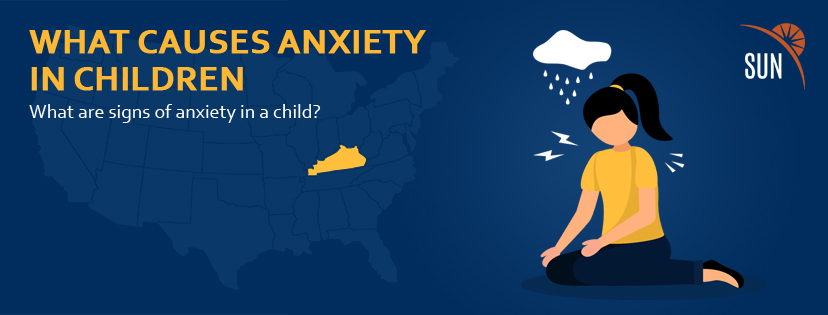Services
- Home
- Mental Health
- Who We Treat
- How We Treat
- Patients & Visitors
- About
- Lexington
close

Like a lot of things in life, anxiety isn’t as straightforward as it’s sometimes presented. You can definitely look at specific things in your child’s life and see if anxiety is a problem, though. There is more than one type of anxiety disorder, some that are mild and treatable without medication, others more severe and best treated with medication. First, some stats.
The Centers for Disease Control and Prevention (CDC) shows in 2019 approximately 4.4 million children had been diagnosed with anxiety disorders. That’s 7.1% of children in the United States and a pretty large number. Another study showed that the rate of anxiety disorder diagnoses increased by 17% in only five years.
We want to make sure we’re helping you meet those needs you maybe didn’t know you had, so if you're not sure whether your child has anxiety, here’s a guide to help out. There are definitely symptoms you can look for, and each one can be related to a different anxiety disorder.
First, let’s look at Generalized Anxiety Disorder. Anxiety itself isn’t abnormal and is in fact recognized as a normal part of life, including the process of growing up. When it becomes a problem is when it sticks around long enough to impact daily life.
The University of Rochester Medical center says “...sometimes worries and fears don’t go away. They may interfere with a child’s normal activities. In these cases, an anxiety disorder may be present.”
They list many symptoms, but key symptoms are excessive worrying over something that hasn’t happened yet, worrying about friends and school or activities, sleep problems, being easily startled, and fatigue.
All of these, and other symptoms as well, can differ from child to child. They can especially be hard to recognize as anxiety because some of them are common for other health problems or even just normal parts of growing up. It’s always best to observe, and ask a professional if you notice the symptoms continuing.
Another type of anxiety disorder that can be more serious than Generalized Anxiety Disorder is Panic Disorder. Many children diagnosed with Panic Disorder also have other anxiety disorders — it can be as many as 90%.
Panic Disorder brings with it different symptoms, including sweating, shaking, feeling like something bad is going to happen, an accelerated heartbeat, and potentially shortness of breath or feeling like it’s hard to breathe.
Most doctors and scientists agree that it’s most likely a combination of biological and environmental factors. That may seem like a fancy way to say “I don’t know,” and partially, it is. But studies haven’t been able to pin down exactly why children develop anxiety disorders.
Our brains still remain a mystery in some cases, and although there isn’t one thing a doctor can say is causing anxiety, there are treatments for anxiety available.
It feels awful to see your child struggling and have no idea how to help, especially after learning that no one really knows exactly why anxiety develops in children. But the good news is there are treatments that work.
The first step is to get your child an appointment with a doctor to figure out if the anxiety is happening due to some other factor, a common one being trauma. If the doctor decides an anxiety disorder is a problem, medication may be prescribed (common ones are citalopram, escitalopram, fluoxetine, etc.). A second step may be to schedule visits with a psychiatrist or other mental health professional for behavioral therapy.
Here at SUN Behavioral Health, we have two levels of care for children and adolescents. First, our Inpatient Program for children and adolescents allows us to care for your child while they stay here, and receive a diagnosis and treatment plan. The Inpatient Program also has individual and group therapy sessions, including Cognitive Behavioral Therapy, which focuses on identifying areas of trouble or stress and working through emotions related to them.
The second treatment is called the Intensive Outpatient Program (IOP). In that program, adolescents stay at home but return to SUN’s building for group therapy three days a week. The program can include more options for treatment, including CBT and parent/child therapy, based on our assessment of what is needed to get someone struggling with mental health back on track.
What Are Signs of Anxiety In a Child?
Some signs are: excessive worry that doesn’t seem to go away, avoiding school, excessive irritability, muscle tension, sleeping problems, and sometimes sweating, shaking, or feeling as if something bad is always going to happen.
How Do You Stop Anxiety in Children?
Most often it’s through the use of medication and therapy, though each case is different and may only require one or the other.
What Causes Anxiety Disorders to Develop?
Unfortunately, no doctor or expert is entirely sure. There are studies showing children of anxious parents are more likely to develop anxiety disorders, but nothing has proven exactly why that is. It may be a combination of both biology and environment — “nature versus nurture”— but as of now, no solid explanation exists.
Does Childhood Anxiety Go Away?
It can, and in the cases where it does the likelihood is the anxiety was “normal,” or in other words, a natural response to the stresses of living and growing up. Anxiety is a normal function of our brains and bodies, but when it becomes hard or impossible to push aside and have normal experiences, it’s possible there’s a deeper problem.
If you think your child is dealing with an anxiety disorder, let us know. We have professionals here that can help with diagnosis and treatment, and definitely get you some answers. Don’t be afraid to call even if it’s just to ask some questions before you’re ready to take the first step toward treatment. Call us at 859-429-5188.